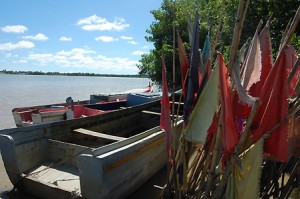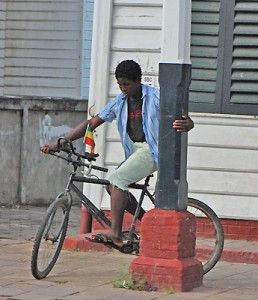Forgiving
The Dutch press is giving a lot of attention to the new amendment to the amnesty law in Suriname. The amendment now protects the suspects in the ‘December murders’, a 1982 rounding up and extra-judicial execution of critics of the government. The current president of Suriname is in fact one of the 25 defendants in an ongoing trial for both these murders and also murders of civilians in 1986 in a village in the east of Suriname. This amnesty now exempts him as well as his co-defendants. It seems an affront to attribution of responsibility with the right actors. The Dutch government has recalled its ambassador. I am unable to find much else on the Internet relating to this story. (One reason for the lack of attention may be that many people in the Global North do not even know where Suriname is located, and even regional plans dealing with Latin America are unsure as to whether the Guyanas and Suriname should be included or not.)
It is clear that persecuting government critics is intended to dissolve objection to one’s path. It is an extreme form of the character assassination practiced -most notably in the US election advertisements – to undermine the popularity of one’s opponents. Journalists are essential social actors whose job is to be incisive, critical, and searching for the truth. Two were murdered in the Suriname December murders (along with lawyers, union leaders, and others). And this same approach continues. While in Central America, I read a news report about two journalists missing and then found murdered. Strangely, I can’t find any such story on the Internet today – although the Net does abound with stories of murdered journalists in Honduras, Somalia, and many other countries.
What is the balance between ensuring responsibility of acts and reconciliation?
In Guatemala currently, investigational tribunals are taking place to examine the information available about army murders of civilians in the 1980s. In El Salvador, as I mentioned in a previous post, there are numerous displays of guns, although the degree of reconciliation is obscured by the huge problems of 38% unemployment and thousands of deportees arriving back from the US every month, combined with the criminality associated with the international illegal trade in recreational drugs.
What do we do after wars? A survey of 500 Dutch people in 1999, more than a half century after the end of the occupation of The Netherlands by the Nazis, found that 10% could not forgive even young Germans, who had not yet been born during the war. I hear stories, sometimes told with naive bemusement by Germans, of being treated badly by Dutch people, even professionals. A Quaker friend was verbally abused for having a German license plate on her car when living in The Netherlands. Another was nearly reduced to tears by a Dutch airline representative. German tourists in the Netherlands are treated more kindly if they speak English rather than than German. What does this contribute to reconciliation? The professionals who are unpleasant to Germans even in the course of their work are presumably younger than 65, which means they are not likely to have first hand experience of the German occupation. It is time for the rest of the Dutch population to let go of the victim role. Giving up the grudge does not prevent the past from being recognized; it simply allows the society to move forward.
There have been dozens of wars since 1945. Scores of war-related injustices and killings. The only shining example seems to be the Truth and Reconciliation Commission‘s role in resolving hurts from apartheid times in South Africa. Bouterse, the president of Suriname, does not exhibit any remorse or even acknowledgement of eyewitness reports. In fact, the relatives of those executed without due process in 1982, had to fight to try to open an investigation. Others claim it is a closed chapter, but simply closing the skin over the wound allows it to fester. Like a cut, healing is promoted with exposure to the open air. That is the key difference. Two weeks ago, a former ally of Bouterse stated under oath that the President in fact personally shot two of the victims. That seems colder, but it does not increase the responsibility apparently already resting with Bouterse.
It is straightforward to conclude that robbing life from a person is against their human rights. We are right to consider such cases open until responsibility is admitted. Punishment is generally demanded, although internal change that would prevent repetition, is what we really seek. But there are so many ways in which people’s rights are infringed. In Guatemala, there is conflict over use of upland rivers for hydroelectric schemes, and over mining. And what about environmental injustice? Do we forgive companies which bottle water, and in times of drought refuse to lessen their extraction, so locals don’t have enough? Do we forgive those who have polluted soils? For use of pesticides, which have been linked to bee declines? How do we encourage right acting in the world when it is not internally driven?



Leave a Reply